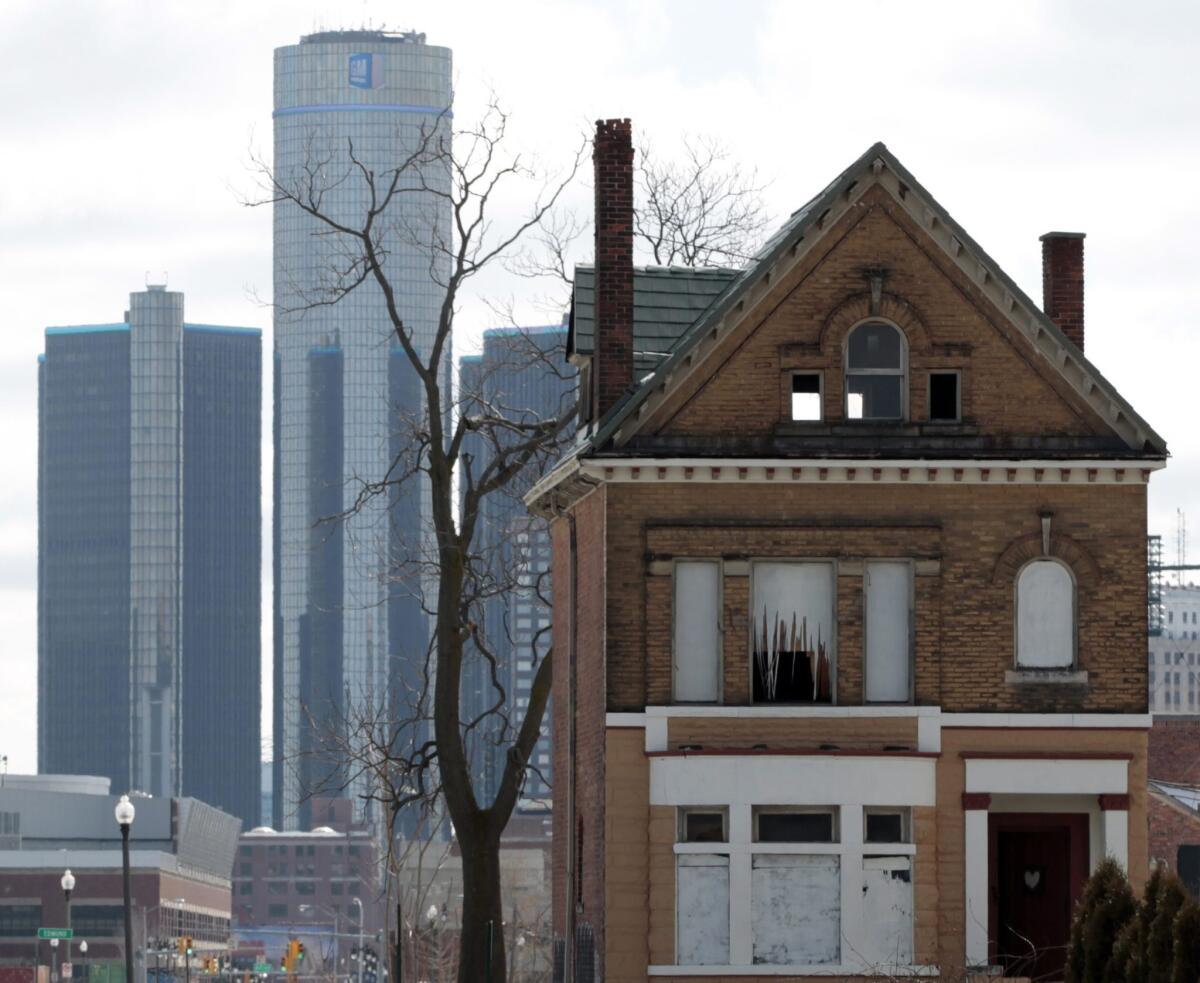Motor City blues

- Share via
Michigan’s Republican governor, Rick Snyder, took the unprecedented step last week of announcing that he considers Detroit’s elected leaders incapable of fixing the city’s fiscal problems, and so he will appoint an emergency financial manager with sweeping authority.
That’s a flawed approach. The problem in Detroit is not the people in charge (though some Detroit leaders have certainly failed the city). The real problem is the broader structure of government in the region. And therein lies a lesson for other urban areas and, perhaps, a template for avoiding what befell the Motor City.
Detroit, once the nation’s fourth largest city, has been crumbling since the 1950s, when its population peaked at a little over 1.84 million people. Estimates put the current population at under 700,000, and Detroit leads the nation’s large cities in the percentage of people living below the federal poverty line. More than a quarter of Detroit’s 140-square-mile city is now empty space. A Detroit house is cheaper to buy than a new car, and a high-paying job within the city limits is a rare thing to find, even with a recent influx of downtown-focused developments.
The emptying of Detroit stems from a complex mix of intractable racism, corporate and governmental decisions, failed institutions and crime levels that have driven most of the middle class to the suburbs. Local governments have regularly undercut each other with tax deals to lure jobs (much as Texas Gov. Rick Perry tried to do on his recent visit to California). These deals have helped corporations at the expense of communities like Detroit, causing the city’s tax base to shrink faster than the city government could adapt and leaving it with massive debt, annual operating deficits, a demoralized workforce, an impoverished population base — and no plan for how to fix things.
It’s time for new ideas. But the type that Snyder, a former venture capitalist (and onetime executive with the Irvine-based Gateway computer company) is likely to favor aren’t what’s needed.
Although the new financial manager for Detroit hasn’t yet been named, it is likely that he or she will move to abrogate union contracts for city workers, gut city management ranks and sell off assets, thereby privatizing such government services as public transit, streetlights and trash collection systems. These things have the potential to reduce the city’s costs and alleviate the immediate cash crisis, but they are disastrous over the long term, and they’ll be done without approval by the city’s elected leaders.
This kind of managerial coup d’etat is at heart an abrogation of democracy and a failure of vision. Slashing spending and privatizing assets won’t fix Detroit, or any of the nation’s other troubled cities. This crisis calls for reinvention.
The people who left Detroit did so in a million individual decisions framed by dwindling jobs and shrinking wages, persistent crime, a collapsed public school system and inadequate services. But the collapse of city services has been a symptom of the underlying problems, not the cause. In fact, the Detroit News recently reported that half the city’s property owners have stopped paying their property taxes partly out of anger and frustration with the lack of services. “Why should I send them taxes when they aren’t supplying services?” the paper quoted one resident as saying. “It is sickening.... Every time I see the tax bill come, I think about the times we called and nobody came.”
To come back, Detroit needs to start finding ways to change those factors. A racial divide, which pits white-majority suburbs against a black-majority city, is the toughest problem, but even it is solvable. The most important step would be to regionalize crucial services, including schools, police and fire protection. As much as suburbanites might dislike the notion, the metro region’s economic health depends on a vibrant and diverse economy and a stable core city. And as much as Detroiters may balk, they, in turn, need the support of the suburbs if they are to climb out of this hole.
Detroit is not dead. In fact, as a nation, we should look at it as a big canvas on which to reimagine what a city can be.
In addition to regionalizing rather than privatizing some services, Detroit could start by offering the land it holds for back taxes to working homesteaders — not speculators — who will commit to five or seven years of occupancy. The same strategy could be applied to the abandoned commercial and industrial sites lining Detroit’s main thoroughfares, converting liabilities into taxpaying properties and, in the process, creating urban villages.
Detroit has been lurching from crisis to crisis for decades, and a state takeover now will do little to fix the underlying issues. City, state and national leaders need to engage creatively, not punitively. Detroit’s problems, like those of most of our troubled cities, are not Detroit’s alone.
Simply carving up the city’s assets and selling them off would propel the downward spiral. Rather than angels coming to help, those wings on the wind are circling vultures.
Scott Martelle is an Irvine-based writer and the author, most recently, of “Detroit: A Biography.”
More to Read
A cure for the common opinion
Get thought-provoking perspectives with our weekly newsletter.
You may occasionally receive promotional content from the Los Angeles Times.







